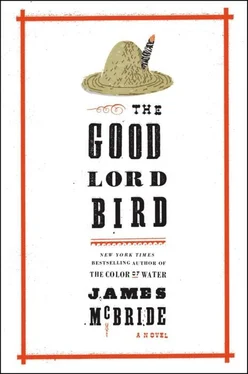We drug and slung along one hundred fifty miles toward Tabor, Iowa—it took two months—freeing coloreds as we went. Tabor was free country in them days, but it was winter and tough going, in twelve degree weather, on a trail caked with six inches of ice, and the Old Man praying over burnt squirrel and old johnnycake the whole time. Luckily we had stolen a bunch of booty from Pikesville and a few slave owners along the way: ammo, guns, two Conestoga wagons, four horses, two mules, one ox, bedding, frying pans, tins, some trousers and hats, coats, even a sewing table and apple barrel, but game on the prairie in winter is scarce, and we was plumb out of food in no time, so we traded with whomever we come across as we plodded along, and survived that way. In that manner I was also able to secret me a pair of trousers and a hat and underwear with nobody giving a hoot’s notice, for it was too cold to care what a person wore out there. By the time we hit Tabor, Iowa, we was exhausted and hungry—except for the Captain, who sprang up every morning bright as a bird, ready to go. It seemed like he didn’t need sleep. And food didn’t interest him in the least, ’specially anything revolving around butter. He’d quit the living game altogether if it meant eating butter. Something about that delicacy just throwed him. But if it was turtle soup or roasted bear, why, he’d rustle through a pigsty in his drawers in the dead of winter just to get a whiff of that kind of game. He was queer that way. An outdoor man to the limit.
He was all but enthusiastic the moment we hit town, which was strangely quiet when we plodded into the village square. He looked about and breathed deeply. “I am thankful we is in abolitionist territory,” he crowed as he sat atop his horse, gazing about. “Even the air seems clearer. Freedom lives here, men. We are home. We shall rest here through the winter months.”
We stood there for an hour and that town stayed quiet as a mouse fart. Not a door opened. Not a shutter moved. The town folks was panicked. They wouldn’t have nothing to do with us. After a while we was so cold we knocked on doors looking for shelter, but no homestead nor tavern wanted us. “Murderer,” a woman chirped, slamming the door. “Crazy old man,” said another. “Keep out.” One man told him, “I am against slavery, Captain, but I’m against killing. You and your men can’t stay here.” It went like that all through town. Tabor was free country in them days, and he was known to every abolitionist east of Missouri, but they was just stone chickenhearted about the whole business. Course the Old Man was hot, too, a wanted man with a price on his head. Every newspaper in the country crowed about how he knocked a few heads off back in Kansas Territory, so I guess that made ’em shy, too.
We went to just about every door in town, a parade of freezing, ragged men, beaten mules and starving horses, and when the last was slammed in his face, the Old Man was irritated but not downtrodden. “Talk, talk, talk,” he muttered. “All the Christian can do is talk. And that , men,” he said, as he stood in the middle of the deserted town, wiping the snow off his whiskers, “is our true battle. Your basic slave needs freedom, not talk. The Negro has listened to talk of moral suasion for two hundred years. We can’t wait. Did Toussaint-Louverture, wait for the French in Haiti? Did Spartacus wait on the Roman government? Did Garibaldi wait on the Genovese?”
Owen said, “I am sure they are good people of whom you speak, Father. But it is cold out here.”
“We ought to be like David of old,” the Old Man grumbled, “living off the grace and nurturing of our King of Kings, who provides for all our needs and wants. I myself am not cold. But for your sakes I do have a few friends left in this world.” He ordered the men to saddle up again and led us out to a few farmers in nearby Pee Dee who agreed to take us on—after the Old Man sold them most of his horses and wagons and made arrangements for us to help them shuck corn and tend their homesteads through the rest of the winter months. There was some grumbling, but the men was grateful to have food and shelter.
Soon as that was arranged, the Old Man announced, “I has sold the wagons and our supplies for a purpose. I needs a train ticket to go back east. I will leave you here, men, in comparative warmth and safety, whilst I travel to Boston alone to seek out funds in the name of our Redeemer. For we needs to eat, and our fight requires money, of which there is plenty back east, which I will fetch from our many supporters there.” They agreed, for a warm place to sleep was golden and we was exhausted, whereas the Old Man was kicking like a Texas mule.
As the Old Man made ready to go east, his men gived him a few things to take with him, letters for home, gifts for friends, and blankets to keep warm. As he gathered them things, he announced, “Kagi, you is my lieutenant, and you will be in charge of training the men in military exercises and the like that they’ll need in our fight against slavery.”
Kagi nodded his agreement. Then the Captain cast an eye at yours truly. “Onion, you will come with me.”
Owen looked surprised. “Why her?” he asked.
“Onion is a good-luck charm. She is reminiscent of your dear brother Frederick, who lies sleeping in this territory and whose goodness attracted both beast and human. We need every tool now for our purpose, thus it is time to bring the Negro to the fore for his own liberation. I will need her to help hive the Negro. Both the Negro and our white supporters will see the innocence of her countenance and say, ‘Yea, child, ye of the Blessed Father, we will inherit the kingdom. He has prepared for us, and we will join up to fight for the cause of our children!’ They will come by the thousands!” And he clapped his hands and nodded his head. There weren’t no stopping him in the way of enthusiasm on the matter of freedom.
I weren’t against it, naturally. I wanted to get out the plains fast as possible. It was my intention to jump off soon as he looked the other way. But Bob was there. He’d clung on through the cold trek over the prairie, having been grabbed up by Owen in Pikesville and pulled along, like always. And just like always in the past, Bob laid low for his chance to cut, and when he seen the Old Man’s intent to head east to free country, he spoke out.
“I can help you find Negro soldiers,” he announced, “for the Negro is more inclined to listen to the saying of a colored man than a girl.”
Before I could argue the point, the Old Man snorted. “God is no respecter of men over women, good Bob. If a man can’t meet the needs of his own women or children, why, he’s just half a man. You stay here with the rest, for the thousands of Negroes that will flock to our stead will need you to calm them and keep them from pounding the bushes until our war starts, for they will be anxious to go at it. Me and Onion will lay the groundwork, and then you, sir, will be our ambassador to welcome them into our army of men.”
Bob sulked and stayed back and kept his peace, which, as it turned out, weren’t long, for two weeks after we got back east, a letter come to the Captain that Bob had run off.
* * *
We took a train that hauled us from Chicago to Boston, which is what the Old Man said his plan was. Rolling behind that steam engine was a slam-banging, bumpy, clickety-clackety situation, but it was righteous warmer and more comfortable than the prairie. He traveled variously as “Nelson Hawkins,” “Shubel Morgan,” or “Mr. Smith,” depending on what he could remember, for he often generally forgot his fake names and often asked me to remind him which one he was using. He made various attempts to comb out his beard without success, but with me traveling incog-Negro, posing as a consort, he weren’t tricking nobody. I looked raggedy as an old knot rope from weeks on the prairie, and the Captain was famous as bad whiskey. The Pro Slavery passengers cleared out the car when they saw him, and anytime he professed a need for food or drink on the train, why, the other Yankee passengers ponied up whatever food they had for his pleasure. He took these gifts without a blink. “These is not for ourselves, Onion, but rather in the name of our Great Haymaker and for the cause of liberty of our enslaved brothers and sisters.” He ate only what he could eat and not a drop more. That was the ironical thing about the Old Man. He stole more wagons, horses, mules, shovels, knives, guns, and plows than any man I ever knowed, but he never took anything for hisself other than what he used personally. Whatever he stole was for the cause of fighting slavery. If he stole something and didn’t use it, why, he’d run it back to the poor drummer he stole it from to return it, less’n course the feller was disagreeable, in which case he’d liable to find himself dead or roped to a pole, with the Old Man lecturing him on the evils of slavery. The Captain enjoyed lecturing captured Pro Slavers on the evils of slavery, so much so that a couple of ’em said, “Captain, I’d ruther you plugged me now and get it over with than lecture my ears one more second, for your words is drowning me. You is killing me here.” Several prisoners quit the game altogether and dropped off to sleep as he lectured, for many of ’em was drunk, only to wake up sober to find the Old Man praying over them, which was even worse torture, being that they was now sober and the Old Man carried on his prayers longer when he had an audience.
Читать дальше












